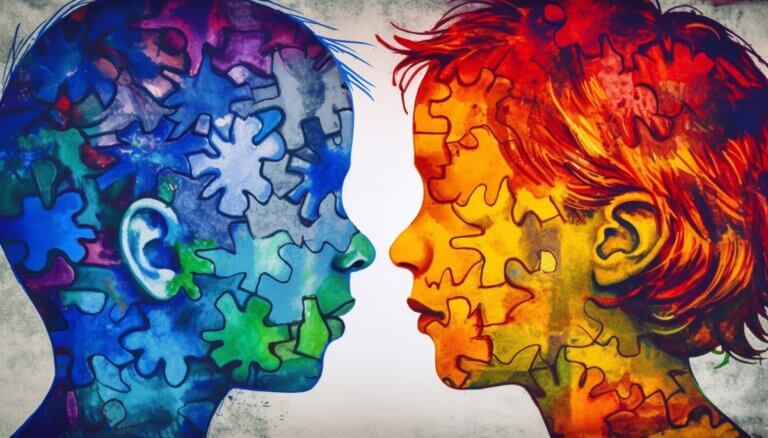Table of Contents
Emotional Intelligence in Leadership

Self-awareness and Self-management
Emotional Intelligence (EQ) is a decisive factor for leadership success in crisis management. It aids leaders in professionally managing emotional crisis leadership and effectively managing both their own emotions and those of their team. But how can a leader develop and apply this competence? Two key factors here are self-awareness and self-management.
Self-Awareness: The Foundation of Emotional Intelligence
Self-awareness is the conscious recognition of one’s own feelings and the ability to understand these emotions. A practical example is a manager who, during a heated meeting, notices signs of anger in themselves. By recognizing their own emotional response, they prevent impulsive decisions or hurtful remarks. Instead, they can decide to take a short break to prevent escalation.
Self-awareness means being self-reflective and understanding how one’s own emotions affect behavior and subsequently the employees. This includes a conscious recognition and application of:
- Physical signals that indicate emotions.
- Thought patterns associated with certain feelings.
- The impact of emotions on decision-making and communication.
Techniques of Self-Management
A critical aspect of emotional intelligence in crises is self-management. This involves controlling emotions so that they are constructive rather than destructive. Examples of effective self-management in crisis times might include:
- Using breathing exercises or meditation to reduce stress.
- Prompt communication with the team to avoid uncertainties.
- Setting clear priorities and boundaries to prevent overload.
A study shows that leaders capable of controlling their impulses and staying rational conduct more effective crisis management. They create an environment where compassion and clear communication paths prevail, thus fostering the well-being and resilience of their team.
In practice, we see this in leaders who perceive typical crisis emotions like fear and uncertainty not as weaknesses but as opportunities to improve and strengthen their leadership qualities. Emotional intelligence enables them to act with emotional clarity and strategic foresight even in turbulent times.
The conscious application of self-awareness and self-management, supported by continuous learning and feedback, thus forms the core of strong leadership in times of crisis. Emotional intelligence is not a static state but a dynamic process that is continuously developed and refined to demonstrate leadership strength, especially in challenging times.
Social Awareness and Relationship Management
In the realm of crisis management, Emotional Intelligence is a fundamental component of successful leadership. Emotional intelligence in crises is particularly proven through social awareness and relationship management.
Social Awareness
Social awareness manifests in the ability to accurately grasp the emotions and motivations of others and respond to them sensitively. A leader who understands their employees during crisis times and takes their feelings seriously can not only communicate more effectively but also create deeper trust relationships. A practical example of this would be a leader who notices that an employee under stress is performing suboptimally. Instead of criticizing, they could seek a conversation and offer individual support to improve the situation and relieve the employee.
- Empathetic listening promotes an atmosphere of trust and respect.
- Recognition and motivation tailored to individual needs enhance team performance.
- Anticipating group dynamics enables proactive actions and conflict avoidance.
Relationship Management
Another aspect of Emotional Crisis Leadership is the quality of managing interpersonal relationships. Effective crisis management therefore also includes building and maintaining strong, goal-oriented teams. This involves clarifying each individual’s contribution to the larger whole and celebrating team successes. An example from everyday corporate life: A leader schedules regular team meetings, where they not only discuss status reports but also provide space for employees to bring in their own ideas. As a result, team members feel valued and integrated into decision-making processes.
- Communicating common goals and values unites the team.
- A feedback culture and open dialogue foster individual and collective development.
- Building networks within and outside the team expands resources for crisis management.
Leadership in times of crisis thus requires a high degree of emotional competence, which manifests in social awareness and relationship management. Being an authentic role model means being able to control one’s own emotions while also empathetically engaging with employees. The value of emotional intelligence offers an indispensable advantage for sustainable success and stability in times of crisis.
Emotional Intelligence in Crisis Situations

Emotion Regulation and Decision Making
Emotional intelligence in crises is indispensable for adequate crisis management. Especially in hectic and stressful moments, it allows us to not let fleeting emotions guide our actions and to make well-considered decisions. The ability to effectively regulate emotions can make the difference between an impulsive reaction that exacerbates the situation, and a deliberate response that contributes to calming the situation.
The Importance of Self-Awareness
The ability to recognize one’s own emotions is the first step towards emotion regulation. A leader during crisis times who can keep their frustration in check will communicate better and find creative solutions, compared to one who lets their emotions run wild. An example is an executive during a corporate crisis. Instead of getting caught up in the general panic, they remain calm and take a moment to assess the situation objectively.
- Recognize your own feelings and their origins.
- Share this self-awareness through clear communication with your team.
- Use techniques like deep breathing or a short reflective pause to maintain a clear head.
Emotional Self-Control as a Key Competence
When we are under extreme stress, it is a challenge to maintain control over our emotional reactions. However, studies show that leaders with high emotional intelligence are able to respond calmly under pressure. They use emotional self-control to consciously steer their response and avoid impulsive actions. This enables them to exert a stabilizing effect on their environment and enhance morale.
- Avoid snap decisions by pausing to reflect before you react.
- Work out solution strategies based on facts, not on the basis of emotions.
- Reflect on past crises and learn from your emotional reactions.
The Role of Empathetic Leadership
Emotional intelligence involves not only knowledge about one’s own feelings but also the ability to recognize and appropriately respond to emotions in others. An empathetic approach can particularly contribute to building trust and strengthening team resilience during crises. Active listening and incorporating the perspectives of all team members foster cooperative decision-making processes, which are essential for crisis management.
- Show empathy and understand the fears of your team.
- Support others in articulating and addressing their emotions.
- Involve all stakeholders in the problem-solving process to promote commitment and consensus.
Emotional crisis leadership is a key competency that promotes organizational resilience. Through effective emotion regulation and decision making, emotional intelligence ensures that leaders and their teams can operate optimally during difficult times.
Stress Resilience and Motivation
In today’s fast-paced world, leaders are faced with new challenges every day. Crisis Management Emotional Intelligence is a critical factor for success. This is particularly evident in the ability to build resilience to stress and to motivate a team even in difficult times.
The Pillars of Stress Resilience
The emotional intelligence of a leadership figure is revealed in dealing with stress. The pillars of stress resilience include self-awareness and self-regulation. Leaders who are aware of their own emotional state can respond more appropriately.
- Self-Awareness: A CEO senses the onset of stress and uses targeted relaxation techniques to maintain her clarity.
- Self-Management: A project manager recognizes agitation in the team and defuses the situation by actively listening and empathetically addressing concerns.
- Social Awareness: A team leader notices the increasing uncertainty of her team and openly addresses it to create space for dialogue and support.
With these core competencies, they are able to strengthen their own resilience and serve as a role model.
Emotional Intelligence in Crises
Leadership in times of crisis requires not only effective crisis management, but also a strong emotional leadership role. Practical examples illustrate how emotional crisis leadership can succeed:
- A CEO faces the challenge of a major corporate upheaval. Instead of spreading panic, he communicates openly about the situation, works with the team to develop solutions, and remains optimistic throughout.
- In a start-up, burnouts threaten due to high workloads. The founder implements regular team discussions and workshops on stress prevention, thereby strengthening collective resilience.
- A department manager faces strong competitive pressure. Through his ability to remain calm, his empathetic approach, and celebrating small successes, he keeps his team motivated and effective.
These strategies not only help to increase one’s own stress resilience but also motivate and strengthen employees during difficult times.
Motivation as a Leadership Task
Emotional intelligence is completed by the competency to inspire and motivate others. It’s not just about setting goals, but also about creating an atmosphere where employees feel valued and want to perform at their best.
- A manager uses his emotional intelligence to recognize individual strengths of team members and specifically deploy them, making each person feel an important part of the overall success.
- A leader fosters a culture of trust and support by showing vulnerability himself, thus establishing a genuine human connection with the team.
- With regular feedback and the encouragement to view challenges as opportunities, a team leader continuously develops the competencies of his team.
In summary, it can be said that leadership in crisis times requires special emotional intelligence. The ability to manage stress, motivate oneself and others, and thereby create an atmosphere of trust and confidence are key to success.
Summary
Emotional intelligence in crisis management is an indispensable tool for leaders to successfully navigate times of challenges. This ability enables them to not only manage their own emotions but also to empathetically address the emotions of their team, thus optimizing crisis management through emotional intelligence. Effective self-management and the development of self-awareness are essential for resilient leadership during crisis times.
Self-awareness and Self-management
A central pillar of emotional intelligence is self-awareness. Leaders who recognize and understand their emotions avoid rash reactions and can thus maintain team stability. Self-management, on the other hand, refers to the ability to employ emotional regulation techniques such as breathing exercises or meditation to reduce stress and communicate clearly. Studies show that such actions promote a constructive work environment and efficient crisis resolution.
- Application of relaxation techniques in moments of stress.
- Clear, audience-oriented communication to minimize misunderstandings.
- Building awareness of the impact of one’s own emotions on decisions.
Social Awareness and Relationship Management
Social awareness complements self-awareness by enabling leaders to recognize and empathetically respond to the emotions of their team members. Emotional crisis leadership goes hand in hand with relationship management, which is strongly focused on building trust and establishing a positive team dynamic. By involving all team members in the problem-solving process, a cooperative and resilient atmosphere is created.
- Sensitive responsiveness to the feelings of employees.
- Empathetic listening and acknowledgment enhance team spirit.
- Communication of visions and shared goals to promote engagement.
Emotional intelligence in crises is a dynamic process that requires continual development. This enables leaders to act adaptively and with foresight in challenging situations. Cultivating these competencies is vital for authentic and competent crisis management, which not only fosters team resilience in difficult times but also contributes to sustainable crisis resolution. By creating an environment of trust and involving all team members in decisions, they ensure that their emotional leadership role secures long-term success.
FAQ – Emotional Intelligence in Crisis Management
How can emotional intelligence help a leadership team communicate and act effectively during a crisis?
Emotional intelligence enables a leadership team to recognize and sensitively respond to the emotions and needs of their employees during times of crisis, thereby strengthening trust and collaboration. Through a deep understanding of one’s own emotional state and that of others, clear and calming messages can be conveyed, which facilitates decision-making processes and leads to thoughtful actions. Leaders with high emotional intelligence are thus able to create an atmosphere of safety and stability, even when the situation is uncertain.
How can emotional intelligence specifically contribute to effective leadership in crisis situations?
In crisis situations, emotional intelligence enables leaders to delicately perceive the emotions of their team and respond accordingly, which strengthens the trust and motivation of the staff. It promotes communication and cohesion by helping to manage stress, build empathy, and conduct constructive feedback conversations. A leader with high emotional intelligence can thus enhance the team’s resilience and navigate it through challenging times by using emotions as a guide and developing adaptive solutions.
What specific behaviors do leaders with high emotional intelligence exhibit in crisis situations?
Leaders with high emotional intelligence demonstrate composed and empathetic behavior in crisis situations, by actively listening, understanding the emotional state of the team, and offering support. They maintain calm, make thoughtful decisions, and communicate clearly and motivatingly to strengthen trust and cooperation within their group. Additionally, they reflect on the events to learn from them and better manage future crises.




